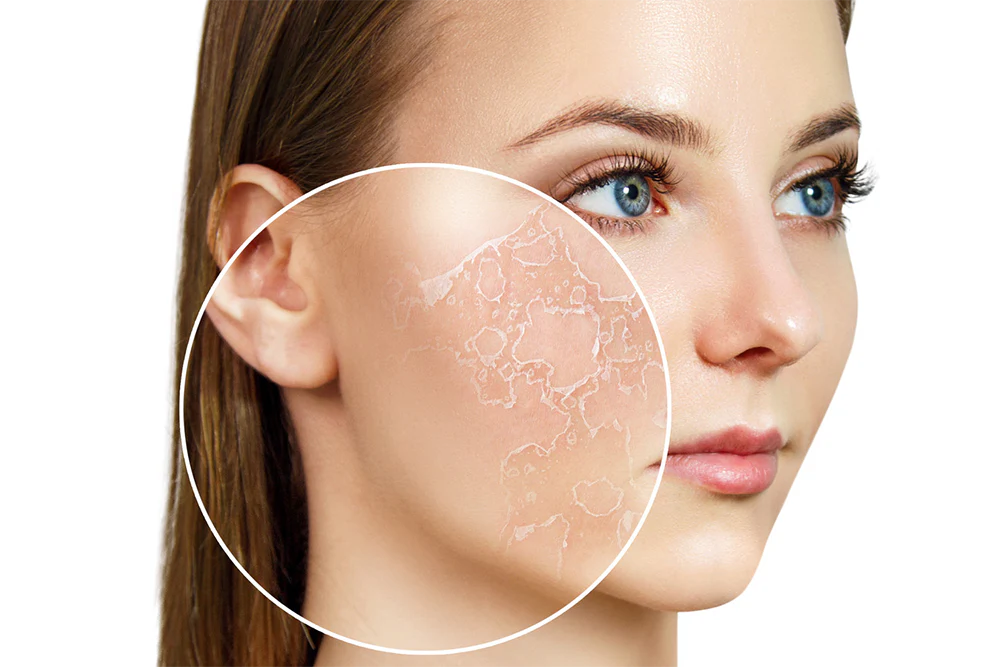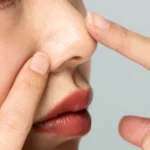Dry skin, medically known as xerosis, is a common condition affecting people of all ages. It occurs when the skin’s natural moisture balance is disrupted, leading to tightness, itching, flakiness, and even cracks. In this guide, we will explore the causes of dry skin, the most effective treatments, and ways to prevent it from recurring. By understanding and addressing the root causes, we can significantly improve skin health and restore its natural hydration.

Understanding Dry Skin: What Causes It?
Dry skin results from the loss of moisture in the outermost layer of the skin, the epidermis. Several factors can contribute to this condition, and it’s essential to identify the underlying cause to effectively treat and prevent it.
Environmental Factors
- Cold weather: During the colder months, the air tends to have less moisture, which can strip the skin of its natural oils.
- Low humidity: Dry indoor air, especially during the winter, can cause the skin to lose moisture more rapidly.
- Hot showers: Prolonged exposure to hot water can weaken the skin’s protective barrier, leading to moisture loss.
Skin Conditions
Certain skin conditions can make the skin more susceptible to dryness, including:
- Eczema: A chronic condition that causes the skin to become inflamed, leading to dryness, redness, and irritation.
- Psoriasis: This skin condition accelerates skin cell turnover, leading to the buildup of dry, scaly patches.
- Ichthyosis: A genetic condition that results in rough, scaly skin, often leading to severe dryness.
Lifestyle Factors
- Harsh skincare products: Products containing alcohol, fragrances, or other harsh chemicals can strip the skin of moisture.
- Age: As we age, the skin produces less oil, which leads to increased dryness.
- Dietary deficiencies: A lack of essential fatty acids, vitamins, and minerals in the diet can contribute to dry skin.
Medical Conditions
Several medical conditions may exacerbate dry skin, such as:
- Diabetes: High blood sugar levels can cause dehydration, leading to dry skin.
- Thyroid disorders: Conditions like hypothyroidism can cause dry, flaky skin due to slower metabolism.
Symptoms of Dry Skin
Dry skin manifests in various ways, and the severity of the symptoms depends on the underlying cause. Common signs include:
- Tight, rough, or scaly skin: The skin may feel tight and rough, especially after showering.
- Itching: The dryness can lead to itching, which may worsen as the skin becomes more dehydrated.
- Redness or inflammation: In severe cases, the skin may become inflamed or even cracked, leading to discomfort.
- Flaky or peeling skin: Dry patches may form, which can peel off, leaving the skin looking uneven.
Effective Treatments for Dry Skin
The key to managing dry skin lies in restoring moisture and protecting the skin’s barrier. Below are some highly effective treatments and strategies.
Moisturizing Your Skin
Moisturizers are the cornerstone of dry skin treatment. When choosing a moisturizer, opt for one that is rich in emollients and humectants. These ingredients help to lock in moisture and soften the skin.
- Ointments and creams: These thicker formulations are more effective than lotions in trapping moisture.
- Look for ceramides and hyaluronic acid: These ingredients help to strengthen the skin’s natural barrier and retain hydration.
Hydrating Ingredients to Look For
Certain ingredients are highly beneficial for dry skin and can help restore moisture more effectively:
- Glycerin: A humectant that draws moisture from the air into the skin.
- Shea butter: Rich in fatty acids, shea butter helps nourish and hydrate dry skin.
- Aloe vera: Known for its soothing properties, aloe vera can calm irritated dry skin.
- Vitamin E: A powerful antioxidant that helps repair and protect the skin from environmental damage.
Use Gentle Skincare Products
Avoid products containing alcohol, fragrances, and other irritants that can exacerbate dryness. Instead, choose gentle, hydrating cleansers and exfoliants. Exfoliating the skin with mild exfoliants like lactic acid can help remove dead skin cells without causing further dehydration.
Lifestyle Adjustments
- Avoid hot showers: Use lukewarm water instead of hot water to prevent further drying.
- Humidify your environment: Use a humidifier in your home, especially during the winter months, to add moisture back into the air.
- Stay hydrated: Drinking plenty of water throughout the day helps to maintain skin hydration.
Natural Remedies for Dry Skin
In addition to commercial skincare products, there are several natural remedies that can help alleviate dry skin.
Coconut Oil
Coconut oil is a natural moisturizer that works wonders for dry skin. It contains fatty acids that help to replenish the skin’s moisture, making it an ideal treatment for cracked or flaky skin. Apply a thin layer of coconut oil to dry areas before bed for optimal results.
Honey
Honey is a natural humectant that draws moisture into the skin. It also has antibacterial properties, making it ideal for preventing infections in cracked or irritated skin. Apply raw honey to affected areas for about 15 minutes before rinsing it off with warm water.
Avocado Masks
Avocados are rich in healthy fats and vitamins, making them an excellent choice for dry skin. Mash half an avocado and apply it to your face or body for a hydrating treatment. Leave it on for 10-15 minutes before rinsing.
Preventing Dry Skin: Tips for Long-Term Care
While treating dry skin is essential, preventing it from occurring in the first place is equally important. By incorporating a few simple habits into your skincare routine, you can maintain soft, hydrated skin year-round.
Create a Consistent Skincare Routine
Follow a gentle skincare routine that includes a hydrating cleanser, moisturizer, and sunscreen. Protecting your skin from sun damage is crucial, as UV rays can strip moisture from the skin and exacerbate dryness.
Apply Moisturizer Immediately After Showering
After showering or washing your hands, apply moisturizer to damp skin. This helps to lock in moisture and prevent further dehydration.
Use a Humidifier
In dry, cold climates or during the winter months, using a humidifier in your home can help keep your skin from becoming overly dry. Humidifiers add moisture to the air, reducing the amount of moisture lost from your skin.

